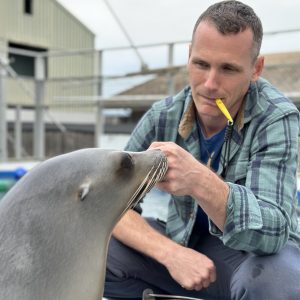Education
Post-Doctoral Fellowship, Emory University
Ph.D., University of California Santa Cruz
B.A. Pomona College
Professor Cook studies animal cognition and comparative neuroscience in a wide range of species. He’s particularly interested in finding novel, ecologically valid approaches to studying brain and behavior outside of the traditional laboratory setting. He’s done work examining the effects of toxic algae on memory and brain networks in wild sea lions; trained dogs to voluntarily participate in fMRI studies in order to probe canine preference and individual differences; and uses high-resolution imaging of opportunistically obtained dead brains to examine neural connections in animals ranging from dolphins to manatees and extinct marsupials. He’s also interested in functional connectivity (brain rhythms and neural oscillations), and toward that end, has trained the only non-human mammal capable of keeping a beat (https://youtu.be/6yS6qU_w3JQ). His interests include Animal Cognition, Comparative Neuroscience, Ecologically Valid Experimental Design, Memory, and Structural and Functional Brain Connectivity.
Recent/Upcoming Courses
Perception and Action
Cognitive Neuroscience
Biopsychology
Current grant funding:
Co-PI, Human Frontier Science Program Grant: The Social Origins of Rhythm, $1.4 million, 2022 – 2025.
Selected Publications
2024 Bauer, G., Cook, P.F., Harley, H. et al. Exploring Marine Mammal Cognition as a Conservation Tool. In review at Marine Mammal Science
2024 Cook, P.F. Limited neurobehavioral data on vocal production learning limit interpretability of cross-species genetic analyses. Eletter in Science in response to Wirthlin et al. Science, 383(6690).
2024 Cook, P. F., & Reichmuth, C. An Ecological and Neural Argument for Developing Pursuit-Based Cognitive Enrichment for Sea Lions in Human Care. Animals, 14(5), 797.
2024 Bauer, G., Cook, P.F., Harley, H. The future of comparative cognition? Conservation! Comparative Cognition and Behavior Reviews (in Press).
2024 Cook, P., Huggenberger, S. & Cozzi, B. Whale Neurophysiology, Chapter in Cetacean Physiology, Fahlman A. & Hooker S. Eds. (pp. 163-191). Academic Press.
2023 Schmitt, T. L., St. Leger, J., Inglis, B. A., Michal, I., Stedman, N., Nollens, H. H., … & Cook, P. F. Twenty Years of Managed Epilepsy for a Stranded Male Guadalupe Fur Seal (Arctocephalus townsendi) Secondary to Suspect Domoic Acid Toxicosis. Journal of Zoological and Botanical Gardens, 4(4), 665-679.
2023 Krucik, D. D., Cook, P., Cathey, M., Meegan, J. M., Gomez, F. M., Van Bonn, W., & Le-Bert, C. Adult-onset epilepsy and hippocampal pathology in a California sea lion (Zalophus californianus): A case study of suspected in utero exposure to domoic acid. NeuroToxicology, 96, 13-18.
2023 Jones, R., Cook, P.F., Reichmuth, C. Ronan and the Legacy of Schusterman’s Sea Lions. The Journal of the Acoustical Society of America 153 A310
2022 Cook, P.F. & Berns, G. Volumetric and connectivity assessment of the caudate nucleus in California sea lions and coyotes. Animal Cognition, 25, 1231-1240.
2021 Henry, M., Cook, P., de Reus, K., Nityananda, V., Rouse, A., & Kotz, S. An ecological approach to measuring synchronization abilities across the animal kingdom. Philosophical Transactions of the Royal Society of London, Series B: Biological Sciences. https://doi.org/10.1098/rstb.2020.0336
2021 Cook, P. F., Hoard, V. A., Dolui, S., Frederick, B. D., Redfern, R., Dennison, S. E., … & Inglis, B. A. An MRI protocol for anatomical and functional evaluation of the California sea lion brain. Journal of Neuroscience Methods, 353, 109097.
2021 Cook, P., Reichmuth, C., & Hanke, F. D. The Mind of a Sea Lion. In Ethology and Behavioral Ecology of Otariids and the Odobenid (pp. 323-345). Springer, Cham.
2021 Hanke, F. D., Reichmuth, C., & Cook, P. The Sensory World of Otariids. In Ethology and Behavioral Ecology of Otariids and the Odobenid (pp. 305-321). Springer, Cham.

